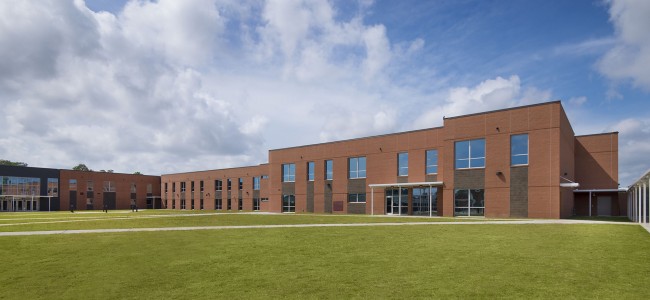GULFPORT HIGH’S FOCUS ON CAREER TRAINING PUTS GRADUATES ON PATH TO SUCCESS
SCHOOL DISTRICT’S DUAL APPROACH EMPHASIZES COLLEGE AND CAREER READINESS
- September 24, 2018
GULFPORT — While most high schools still regard career and technical education as a separate path to graduation, the Gulfport School District is proving that a combination of CTE and academic instruction is the ideal formula for college and career success.
In 2010, district leaders took bold steps to transform how students are prepared for life after graduation by launching The Academic Institutes of Gulfport High School. Centered around 16 national career clusters, the innovative approach builds workforce skills by connecting students’ career interests with relevant academic courses and project-based learning.
“What students need is experience so they can make value-added decisions about the future,” said David Fava, CTE director for the Gulfport High School Technology Center. “Our approach gives students more flexibility to pursue subjects that interest them, which leads to higher levels of engagement and a better understanding of degree and career options and how to prepare.”
The Academic Institutes got a major boost in 2017 with a $40 million renovation of Gulfport High School’s academic, arts and athletic buildings, resulting in state-of-the-art facilities designed to present students with a unique combination of services and curricula unlike any other high school in Mississippi.
Community buy-in and support have been critical to the program’s success. District leaders held a series of town hall meetings to explain the rationale behind The Academic Institutes and its connection to college prep and workforce development. They also made sure to get businesses and industries on board to develop job-training partnerships and create more workforce opportunities for Gulfport High graduates.
“Our young minds are our most valuable resource, but too many top students get jobs outside of Mississippi and never come back,” Fava said. “We can’t continue to let that happen. Our business partners recognize that unless they focus on workforce development, they’re going to face employee shortages. We’re giving them a way to start building those relationships with future employees now.”
“School leaders in Gulfport realized that the way our education system has been preparing young people for the future hasn’t kept pace with modern workforce needs,” said Mike Barkett, president of the Mississippi Construction Education Foundation. “By recognizing the value of CTE programs, they’re opening new worlds of career possibilities for students and helping them build a foundation for lifelong success.”
The dual focus for Gulfport students starts in elementary and middle schools, when they begin learning about career pathways through career awareness and development activities. In high school, they continue examining and identifying career paths that connect with their interests and skill sets while completing a rigorous academic curriculum that emphasizes ACT preparedness.
National credentialing is a program strength, noted Fava, who credits the Mississippi Construction Education Foundation for ensuring that the state’s CTE programs follow standards set by the National Center for Construction Education and Research.
“I’m a big fan of the NCCER model and see value in having a national credential that craft employers honor in every state,” Fava said. “It’s also a strong selling point for businesses that want to partner with us. A national curriculum means everybody’s on the same page, and it helps level the playing field by preparing our students for success in their chosen professions.”
While the college degree track continues to be the right choice for many students, only around 30 percent of high school graduates in Mississippi complete four-year degrees after six years, Fava pointed out. That means the majority of students end up investing a significant portion of their time on a path that often doesn’t pay off with a degree. Adding to their challenges are the burdens of student loan debt.
“As responsible educators, we cannot continue to use our resources in a disproportional way,” Fava said. “We need to invest more time and energy in CTE programs so that more students are exposed to value-added, life-changing opportunities that lead to stable careers and a better quality of life.”
The mission of the non-profit MCEF is to promote careers, recruit capable individuals and train a quality workforce for the construction industry in the state of Mississippi. MCEF also offers workforce training and credentialing in construction, industrial maintenance and manufacturing trades.
